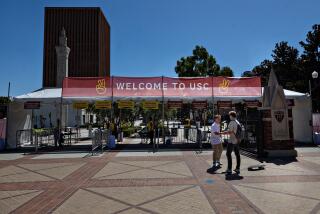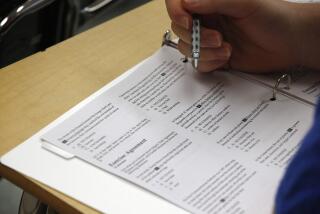Op-Ed: It’s time for California to accept the Uniform Bar Exam

New York Chief Judge Jonathan Lippman, seen here during a Law Day event on May 5, announced that his state would start using the Uniform Bar Exam.
New York’s chief judge, Jonathan Lippman, announced last week that the state would adopt the Uniform Bar Exam, a standard licensing test for lawyers. It’s the largest state to take this step, which Lippman said could result in a “domino effect.” I hope so, and I hope California will be the next state to fall. The current system, under which each state sets its own requirements and won’t recognize out-of-state credentials, is inefficient, burdensome and, frankly, unjustifiable.
Bar exams were rare until the late 19th century. From the late 1880s to the early 1920s, however, the American Bar Assn. waged a successful campaign for states to require a written exam. Traditionally, each state wrote and administered its own test. The purported rationale was to ensure that those admitted to practice law in a given state were sufficiently familiar with its unique laws.
But the truth is that basic principles of law do not vary from state to state. And lawyers can learn the quirky specifics as they go. Forcing students to memorize detailed, state-specific rules, most of which they will never need to know and which they will promptly forget, does not ensure competence.
It’s crazy that a lawyer from, say, Oregon, who has practiced law for decades can’t move across the border into California and pick up where he left off. He’d first have to take the California bar — a significant disincentive given the state’s notoriously low pass rate (it was less than 50% last July). There’s no good reason to make him jump through that hoop, which leads me to believe that so many states retain a distinct bar exam simply because they want to reduce competition.
Restrictive policies may please some lawyers who are already established and have no intention of ever leaving their home state, but they’re bad for clients who end up having fewer choices, as well as for lawyers who value geographic mobility. And because the legal market isn’t exactly robust at the moment, it seems rather cruel to make lawyers restrict their job searches to the states in which they’ve passed the bar exam.
States have already recognized that entirely separate exams are unnecessary. The Multistate Bar Examination, a 200-question, daylong, multiple-choice test, was introduced in 1972 and has become part of the bar almost everywhere.
In 2011, Missouri became the first state to replace its unique essay questions on local law with the Uniform Bar Exam, prepared by the National Conference of Bar Examiners. Fifteen states, now including New York, have followed suit. Test scores from the Uniform Bar Exam are portable across state lines — so long, at least, as those states have signed on.
Under the uniform exam, each state can still set its own threshold for a passing score and can still impose other requirements. New York, for example, will require the completion of an online course dedicated to New York state law and the passage of a short multiple-choice test.
Legal education also would benefit if all states adopted the uniform test. For 35 years as a law professor, I have been telling my students that they shouldn’t take courses in law school about specialized topics that do not interest them just because they are tested on the bar. Many studies show that there is no relationship between the courses a student takes and her chances of passing the bar; and virtually everyone takes a commercial preparation course before taking the bar, anyway.
But, out of fear, many students burden their schedules with dull classes. Of course that means they take fewer classes they might actually like, or that might be more useful to them in their professional careers. The Uniform Bar Exam, which focuses on basic subjects that virtually all students take, would free students of this pressure.
In the medical profession, there’s a national board of medical examiners that sponsors a national licensing exam; doctors don’t have to pass new tests every time they move from one state to another. Shouldn’t there be a similar system in place for lawyers?
Erwin Chemerinsky is dean of the UC Irvine School of Law.
Follow the Opinion section on Twitter @latimesopinion and Facebook
More to Read
A cure for the common opinion
Get thought-provoking perspectives with our weekly newsletter.
You may occasionally receive promotional content from the Los Angeles Times.










